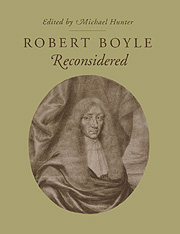Book contents
- Frontmatter
- Contents
- List of contributors
- List of abbreviations
- Preface
- 1 Introduction
- 2 Virtue, providence and political neutralism: Boyle and Interregnum politics
- 3 Science writing and writing science: Boyle and rhetorical theory
- 4 Learning from experience: Boyle's construction of an experimental philosophy
- 5 Carneades and the chemists: a study of The Sceptical Chymist and its impact on seventeenth-century chemistry
- 6 Boyle's alchemical pursuits
- 7 Boyle's debt to corpuscular alchemy
- 8 Boyle and cosmical qualities
- 9 The theological context of Boyle's Things above Reason
- 10 ‘Parcere nominibus’: Boyle, Hooke and the rhetorical interpretation of Descartes
- 11 Teleological reasoning in Boyle's Disquisition about Final Causes
- 12 Locke and Boyle on miracles and God's existence
- Bibliography of writings on Boyle published since 1940
- Index
9 - The theological context of Boyle's Things above Reason
Published online by Cambridge University Press: 03 December 2009
- Frontmatter
- Contents
- List of contributors
- List of abbreviations
- Preface
- 1 Introduction
- 2 Virtue, providence and political neutralism: Boyle and Interregnum politics
- 3 Science writing and writing science: Boyle and rhetorical theory
- 4 Learning from experience: Boyle's construction of an experimental philosophy
- 5 Carneades and the chemists: a study of The Sceptical Chymist and its impact on seventeenth-century chemistry
- 6 Boyle's alchemical pursuits
- 7 Boyle's debt to corpuscular alchemy
- 8 Boyle and cosmical qualities
- 9 The theological context of Boyle's Things above Reason
- 10 ‘Parcere nominibus’: Boyle, Hooke and the rhetorical interpretation of Descartes
- 11 Teleological reasoning in Boyle's Disquisition about Final Causes
- 12 Locke and Boyle on miracles and God's existence
- Bibliography of writings on Boyle published since 1940
- Index
Summary
Scholars have long been aware of Robert Boyle's status as a lay theologian. To date, however, no one has analysed any of Boyle's theological writings in the specific context of the theological controversies of his day. On the face of it, there is good reason for this neglect. These writings appear to be non-polemical in nature, and when this fact is considered along with Boyle's known distaste for controversy it is easy to assume that his theological writings represent simply Boyle's desire to show that a dedicated natural philosopher could be an even more dedicated Christian.
A closer look at Boyle's 1681 Discourse of Things above Reason, however, indicates that when he wrote it Boyle was indeed engaging in a religious controversy — one which has important implications for his philosophical epistemology. Specifically, he was addressing the question of the extent to which human reason can and should be applied to the mysteries of Christianity. In this controversy the Anglican Latitudinarian, Joseph Glanvill, in arguing reason's competence, had pitted himself against certain nonconformist ministers (those refusing to conform to the Church of England after the Restoration of Charles II) who had argued — and would continue to argue — that human reason is not capable of understanding (at least some of) the mysteries of Christianity.
- Type
- Chapter
- Information
- Robert Boyle Reconsidered , pp. 139 - 156Publisher: Cambridge University PressPrint publication year: 1994
- 3
- Cited by



